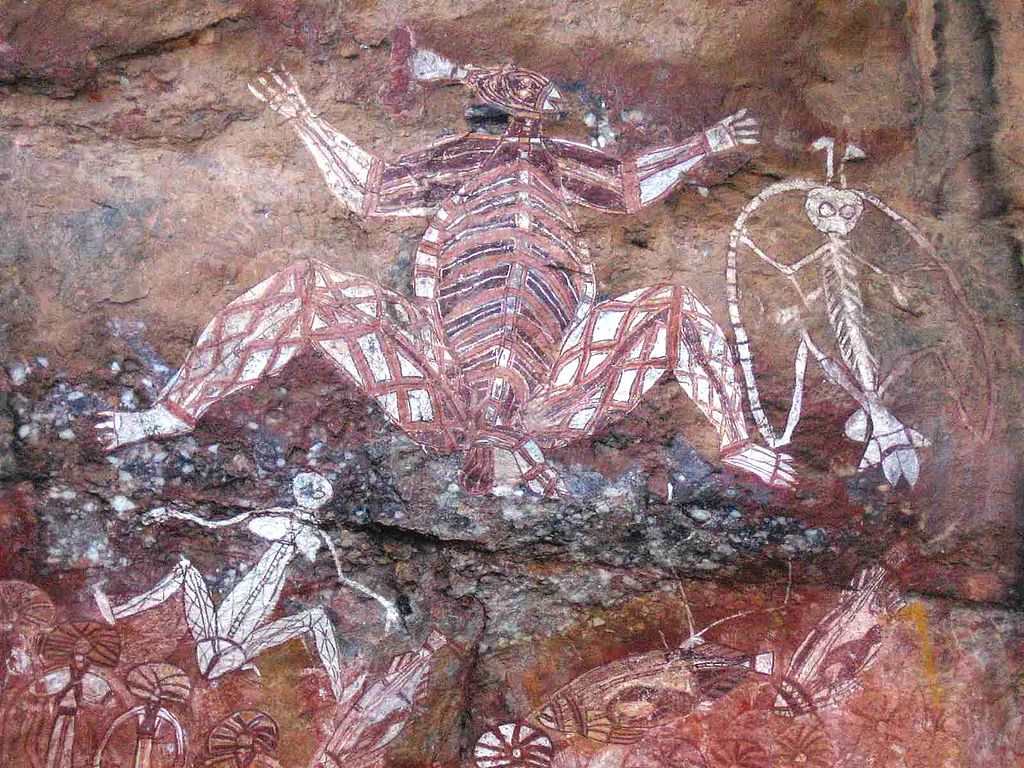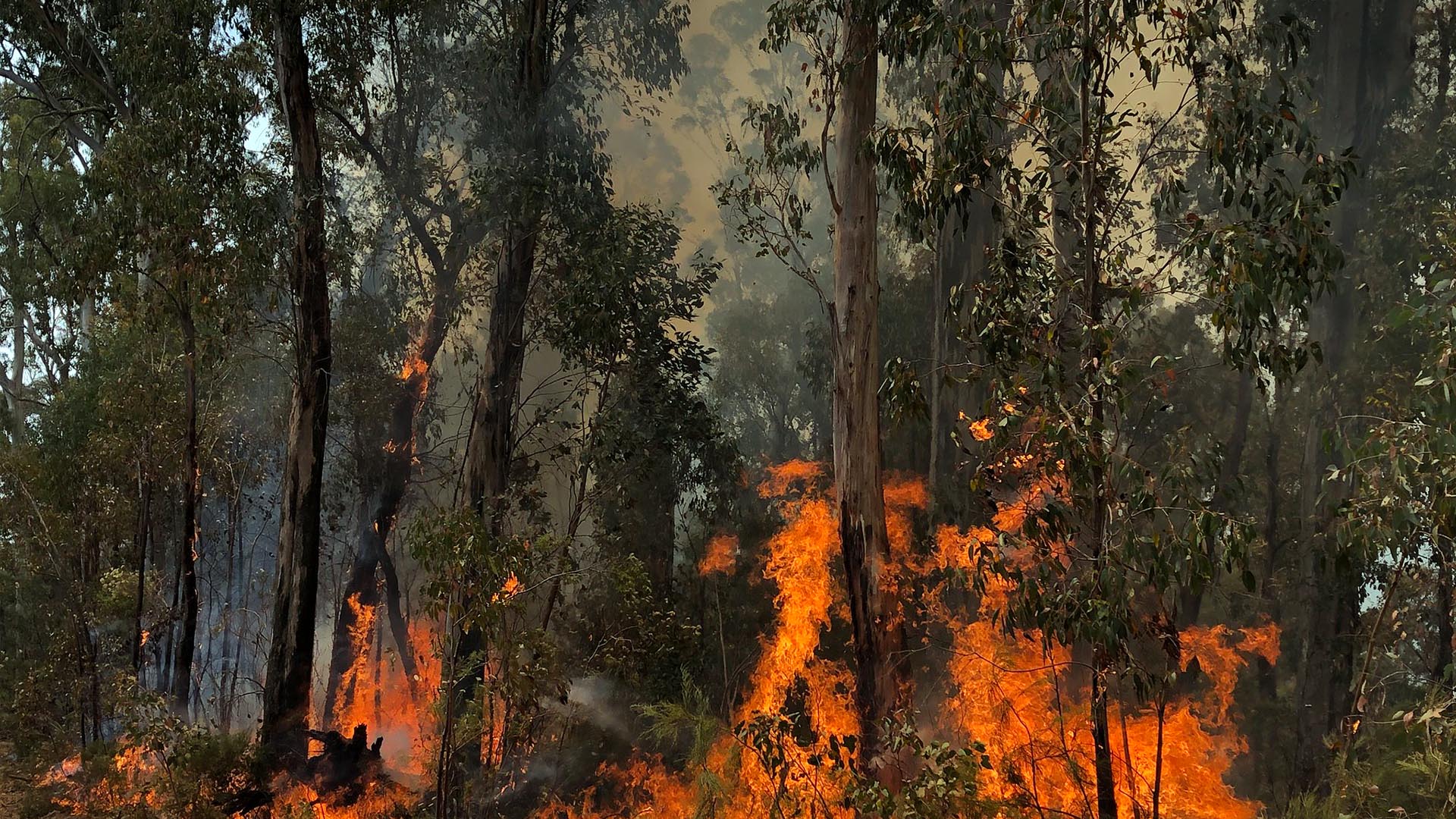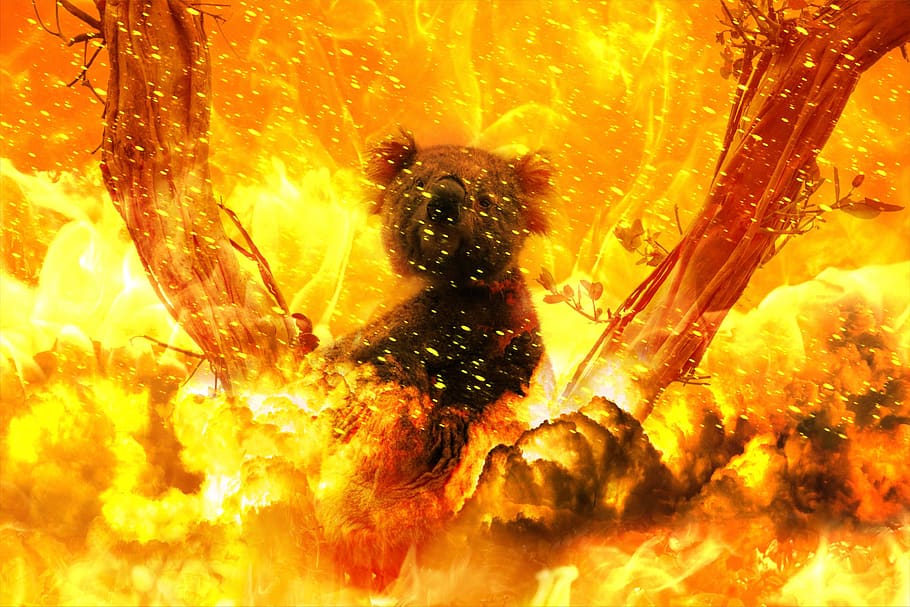Australia’s recent bushfires are the country’s ‘most serious environmental disaster since colonization’. John Keane considers this megadisaster the product of democracy failure, rather than natural forces, which raises questions about political culpability, economic impacts, deep environmental damage and cultural accountability.
A popular poem penned by Sydney-born Dorothea Mackellar in 1904 lyrically portrays a ‘wide brown land’ shaped by ‘ragged mountain ranges’, ‘sweeping plains’, a ‘jewel-sea’, a ‘gold hush of noon’ sun, ‘droughts and flooding rains’.1 My grandmother taught me its lines. I later recited it in primary school and hummed and sang it as a farm boy, rather proudly. The poem left lumps in my throat. It taught me to adore the perfume of the local eucalyptus, the exotic flowers and hopping, pouched animals. And, although I didn’t quite understand its chilling line about the ‘beauty and terror’ of the sunburnt country, the poem had humbling effects. It made me feel dependent on the landscape I loved.
My Country was written by a homesick teenager in England shortly after the adoption of the federal constitution by the Commonwealth of Australia. Her poem refused the past. It was the voice of the future. It plucked the heartstrings of readers. With a whiff of republicanism running through its lines, it has turned out to be one of those rare works of poetry that has become genuinely popular. It was turned into a patriotic song. Some years later, as my political brain germinated, I understood that Mackellar’s ‘sunburnt country’ had been stolen from peoples who form the oldest, continuous civilization on our planet. I learned that the first Australians had managed the country’s sun-drenched mountains and flooded plains differently, more modestly and prudently than invading Europeans. They thought of its ‘far horizons’ and ‘sapphire-misted mountains’ as their material embodiment. They were its spiritual and physical extension. As custodians of their ancestors and future generations, they acted as the land’s guardians and stewards.

Aboriginal Rock Art, Anbangbang Rock Shelter, Kakadu National Park, Australia According to ozoutback.com.au, it shows Namondjok, a Creation Ancestor, with his wife Barrginj below, the Lightning Man Namarrgon to the right, and a group of men and women with ceremonial headdresses underneath. These Spirit figures were repainted between 1962 and 1964, the last major rock painting at the Anbangbang Art site in Nourlangie Rock.
Photo by Saint amand from Wikimedia Commons Saint amand / CC0
A Natural Disaster?
Now what they loved has been badly burned. The scale and depth of the unfinished calamity are hard to fathom at a distance. At close range, things look disastrous. Two and a half months ago, two hundred fires were still burning out of control. Nearly nine million hectares of land had been incinerated, a collective area equivalent to the size of Ireland, over ten times what was destroyed in 2018 by the deadliest fires ever recorded in California. Never mind the multibillion-dollar damage to the country’s tourism and communications infrastructure, a billion native animals have died and countless others have been maimed and bewildered by their loss of habitat. The infernos have increased the rate of bottom-up species destruction; the chances of ecosystem collapse in several regions have escalated Not even the native worms, spiders, grasshoppers and other tiny creatures that dwell humbly and honourably at the base of our local biomes are safe. Crops, farm animals and several thousand homes went up in flames. Nearly 30 people lost their lives. A third of the continent’s citizens have either suffered ruin or know others whose lives have been damaged. For several months, the normally glorious, azure blue skies of my hometown, Sydney, were poisoned by black ash and orange-brown vapours. In mid-January, shrouded in stinking black smoke from fires burning 100 kilometres away, my neighbours shut their windows, pedestrians donned masks and local drivers switched on their headlights. City-wide water bans were imposed. Nearby reservoirs were emptied. January temperatures in Sydney’s western suburbs reached nearly 50°C, the warmest place on Earth. This was just the beginning of what turned out to be the sunburnt country’s second hottest and driest summer ever recorded with temperatures 1.88°C above average. Based on warming trends dating back to 1950, the local Bureau of Meteorology is now forecasting average temperature increases of up to 4°C by 2100.

Photo by BLMIdaho from Flickr 2.0 Generic (CC BY 2.0)
So savage have the devilish infernos been that millions of people are asking after their causes. They are wondering what they might mean for their future lives, for the country and the world as a whole. Catastrophes are of course moments when – to use Dorothea Mackellar’s description – ‘opal-hearted’ citizens not only come to each other’s rescue but also look to their elected leaders for solace, guidance and material support. So what did Prime Minister Scott Morrison have to say on the subject? What has he done to ease this ongoing disaster?
In recent months, I confess, there have been more than a few moments when I have wanted someone to wipe the smug smile off Morrison’s self-satisfied face. But, as this country is called a democracy, I must first let him speak: Tourism Australia’s former boss referred to the bushfires as a ‘natural disaster’. The second-rate, machine politician who ran the first-ever presidential-style campaign to win office in last year’s general election had no clear policies but stacks of photo opportunities featuring him as an unremarkable suburban father and reliable mate in whom his fabled people can trust. ‘How good is Australia!’ were among his first words when elected in 2019. Since then his self-congratulatory tune hasn’t changed.
The sunburnt country of azure blue skies and brown sweeping plains has been in flames, but you’d not know it from Morrison’s media utterances or do-nothing doings. Non sequiturs are his specialty. ‘Climate’, ‘heating’ and ‘fire’ appear to be absent words from his vocabulary. ‘Whatever our trials, whatever disasters have befallen us, we have never succumbed to panic’, he said in his pre-recorded New Year’s Eve video message and continued, ‘The generations of Australians that went before us, including our First Australians, also faced natural disasters, floods, fires, global conflicts, disease and drought […] We have faced these disasters before and we have prevailed, we have overcome … That is the spirit of Australians’.
Complacency
The sunburnt country’s most extensive and savage bushfires began nine months ago in September 2019 and since then a dollar-pinching, neoliberal and soft-populist government has largely acted as though the calamity never existed. It presumes that the brave energies of volunteer firefighters – tens of thousands were in action – and the generous donations and strengthened self-belief of Australian citizens in the ‘Land of the Rainbow Gold’ were all that was required. In terms of media strategy, it was all mirrors and no smoke. And, in matters of strategy, for months the government has been acting out social and political scientist Karl Deutsch’s famous dictum that power is ‘the ability to talk instead of listen’ and ‘the ability to afford not to learn’.2
Imperious complacency is the new normal. The unfortunately surnamed federal Minister for Natural Disaster and Emergency Management David Littleproud said things like, ‘We will continue to respond to changing conditions while these fires affect communities across the country.’ The rote self-confidence is astonishing. It’s what my grandmother, who lovingly introduced me to Dorothea Mackellar, used to call ‘handling the truth carelessly’. Australians nowadays use a pithier expression – they call it ‘bullshit’.
The more the situation edged towards catastrophe, the less Morrison’s government seemed capable of acting wisely and decisively. Pleas made by fire commissioners for additional aerial firefighting equipment were repeatedly snubbed. In mid-December, after helping the United States, Saudi Arabia and Brazil derail the COP25 climate talks in Madrid, the Prime Minister packed his bags and went on holiday to Hawaii. His absence coincided with the period when average national temperatures soared to 41.9°C, the hottest ever recorded. Several key federal and state ministers did the same or blanked mainstream media by switching off their mobile phones.
As the infernos worsened, the government offered no additional funding and twice refused to meet with the Emergency Leaders for Climate Change, a body comprising the most senior experienced former emergency services leaders. Much testosterone was spent offloading responsibility for the calamity onto Australian states and then blaming them for their ineffectiveness. Then things changed, or so it seemed.
With fires raging throughout the country, gate-keeper journalists and gate-watching social media platforms cried out for leadership, and the government began singing to a different tune. Initially, 500 million dollars were tabled for bushfire recovery – a pittance in comparison with the near 30 billion dollars granted annually to the local fossil fuel industry. More dramatically, on 4 January the government announced that 3,000 army reservists would be called up without consulting the chief rural fire services commissioner in New South Wales, who learned of the deployment from the news media. And, in mid-January, rather like reaching for condoms in a maternity ward, a plan for establishing a 2 billion dollar-funded National Bushfire Recovery Agency was announced. Hampered by bureaucracy and unspent money, it has never since functioned properly.
Opal-Hearted Citizens
The wilful ignorance and policy neglect may beggar belief, but a national discussion about the long-term and proximate causes of the ongoing catastrophe has now begun. There is rising public awareness that the catastrophe has more than its fair share of entirely local causes. Millions of citizens know that intense fires are marked by frightening quantum qualities that display a will of their own. People understand the science behind the fires: eucalyptus oil easily explodes and burns with a fury when vaporized; scorched gum trees explode and fireballs spread flames and ash in all directions; and massive heat-stoked clouds called pyrocumulonimbus trigger lightning bolts that spread the infernos, without delivering so much as a drop of desperately needed rain.
Bigger things are happening as well. The country’s opal-hearted citizens are experiencing an epiphany. Despite worn-out governmental rhetoric about ‘natural disasters’, they grow convinced that there are links, no matter how meteorologically indeterminate, between spiralling carbon emissions, rising temperatures, warming oceans, drought and raging bushfires. People are aware that Australia, when measured per capita, spits more carbon gas into the atmosphere than any other country except the US. They have heard that Morrison’s coal and gas-loving government is globally ranked the lowest in matters of climate action. And they have now smelled with their own blackened nostrils and seen with their own reddened eyes what we as ‘weather makers’ – the felicitous title phrase used by Tim Flannery for his best-selling book published over a decade ago in 2005 – are doing to our beautiful land.
Democracy Failure
For the moment, the fires have been extinguished, but the next summer is coming and the calamity is still upon us. My wish is that other lessons will be learned. One issue, so far little publicly discussed by ministers or journalists, which has been a core theme of my research and writing over the past decade, concerns monitory democracy and megaprojects. Billion-dollar megaprojects are a menace to democracy. The global rule is that nine out of ten megaprojects exceed their projected costs and incur delays and outright failures unless those in charge of their complex design and operation are subject to lengthy public scrutiny and democratic accountability. If there is little or no monitory democracy, as I call it, then megaprojects typically produce various disasters. The nuclear meltdown at Fukushima, the massive oil spill caused by the failure of BP’s Deepwater Horizon and the long-delayed opening of Berlin’s new Brandenburg international airport are three examples of how badly things can go wrong in the absence of monitory democracy. The Australian government’s underfunding, poor coordination and mismanagement of bushfire reduction, drought and disaster relief schemes is another case in point. The bottom line is that the megafire calamity that we have suffered is not a natural disaster. It is a political disaster.
The calamity in our sunburnt land is the product of ‘democracy failure’. Economists have long warned that unregulated markets fail and, as a result, produce great misery among their victims. In Power and Humility (2018), I present an anatomy of democracy failure. The book recognizes that things usually go wrong when watchdog and barking dog mechanisms of democratic scrutiny and restraint are lacking. When democracy is in short supply, megadisasters multiply. Democracy failure happens. The equation is almost mathematical: without effective democratic accountability, powerful state and corporate organizations typically make foolish or reckless decisions that wound the lives of citizens and spoil the ecosystems in which they dwell.
Normality?
Democracy failure is exactly what the sunburnt country ravaged by bushfires is now suffering. Questions need to be raised about the likely or probable political consequences of this unfinished tragedy. What can we expect in the coming months and years? Will there be a return to normalcy? Or is this the moment when the lucky country runs out of luck?
A quick return to normalcy is most unlikely. Vast areas of unburned bush remain vulnerable. Military intervention cannot compensate for government ineptitude and societal hurt. The worst-affected, small-town communities may not recover. Inadequate insurance claim payouts are already being bitterly contested in the courts. Most probably, the current warming and drought trends will worsen. Forecasts predict long-term infrastructural damage. According to University of Melbourne estimates, rising costs of 1.19 trillion dollars will be incurred for failing to meet the Paris Accord target of capping carbon emissions to zero by 2050. And, despite the bush’s regenerative capacities, species destruction, including the extinction of much-loved koalas, glossy black cockatoos and native honeybees, is now on the cards.

Photo from pxfuel.com
The whole thing is more than deplorable. Deep feelings of powerlessness and mourning are spreading. The age of solastalgia, the neologism coined by Australian thinker Glenn Albrecht to denote the distress caused by climate change, is upon us. Shocked by the great calamity, many citizens will understandably be fearful of the future. Although Australians can generally see through bullshit, conspiracies and end-of-the-world catastrophe thinking may flourish. Under pressure from the Great Pestilence, the current government-enforced lockdown encourages citizens to forget the bushfire catastrophe they have just suffered. The Morrison government could well survive and be re-elected with the backing of a Murdoch press that owns nearly three-quarters of the local media , and with the help of disinformation spread by bots and trolls. A state of disaster emergency, as first declared in Australia by the state of Victoria’s management act, might become more widespread, frequent and even permanent. Nobody knows where all of these trends might take the country. In the face of ecocide, the political dangers of phantom democracy and despotism, which my new book explores, shouldn’t be underestimated. We are learning again what my wise grandmother knew and Dorothea Mackellar did not foresee: when citizens become anxious, they are putty in the hands of populist demagogues skilled at re-directing discomfort onto unwanted immigrants, ‘greenies’, Muslims and other so-called ‘misfits’.
One thing is certain – in the wake of the most serious environmental disaster since colonization, Australia’s long-term democratic resilience is now being tested. Expectations that the government will be punished for its calculated ineptitude are rising. Fortunately, the federal election cycle in Australia is short: three years only, which means that Morrison’s government will be facing rough music in or before 2022. I very much hope it suffers the defeat it deserves.
Re-Imagining Democracy
Distinguished Australian novelist Richard Flanagan goes further. He says the ongoing bushfire catastrophe is the country’s Chernobyl, likening it to the Soviet Union’s poorly-regulated megaproject corrupted by arbitrary power, which bred demands for glasnost that ripped the entire imperial system apart. The simile, first used by Greenpeace Australia Pacific’s David Ritter, is arguably misplaced. Australia’s failing parliamentary democracy can’t plausibly be compared with a corrupt one-party state socialist system. And yet I agree that fundamental institutional changes are now needed; the grand political lesson of this moment is that democracy has failed with disastrous results.
For several years, I have been publicly saying that Australian democracy is cursed by complacency. The political class is excessively white, male and heavily unrepresentative of an impressively multicultural society. Indigenous peoples are denied formal political representation. The gap between rich and poor is widening. There is no federal anti-corruption commission. Dark money poisons elections. Public service institutions are under assault. Public service media are legally and financially vulnerable. In a system of compulsory voting, well over ten per cent of young people have gone missing from the electoral rolls. Well over a million permanent residents are denied the vote. And the entire political system is wedded to a carbon-based capitalism whose bell is now not just tolling but melting.
An energy regime change and a political revolution are needed. A re-definition of democracy is definitely required. During its remarkably long and stormy history, democracy has always functioned as an anthropocentric norm – it supposes that self-governing humans are the rightful masters and possessors of ‘nature’. Democratic principles need to become viridescent. In an age of monitory democracy, humans need to embrace popular self-government and acknowledge their obligation to treat the ecosystems in which they live as equals entitled to proper political representation in human affairs.
Whether a semantic shift of this kind will happen and an ailing carbon democracy can be transformed peacefully into a more robust and resilient monitory democracy or not is another matter. Let’s suppose it doesn’t happen. What would life be like in Australia within the next couple of years? The Morrison government would act as if it’s business as usual. Using government handouts, army troops and media messaging, it would do all it could to win the next election and normalize the abnormal. Clampdowns on environmental boycotts and public assemblies would tighten. Opposition leaders would tag along, mostly sticking to the script that suggests their job in this hellish moment is to be constructive, practical and not stir up trouble by unhelpfully commenting on Morrison and his government’s overall performance. The political class would play the role of amnesiacs; who even remembers Cyclone Tracy’s near-total levelling of the city of Darwin and its military evacuation half a century ago?. It would bend over backwards to appeal to the fabled ‘quiet’, ‘hardworking’ and ‘optimistic’ Australians. And, if politicians succeeded, fiction would become fact. Australian citizens would choose to be complacent subjects. Gripped by anxiety, with temperatures rising and fires burning before their eyes, they would stop caring about their far blue horizons, brown ragged mountains and emerald jewel seas. The catastrophe would then be complete, leaving poor Dorothea Mackellar to mourn her sunburnt country, awash in floods of angered tears.
D. Mackellar, My Country (originally titled Core of My Heart), London Spectator, 5 September 1908.
K. W. Deutsch, The Nerves of Government: Models of Political Communication and Control, University of Michigan Free Press, 1966.
Published 1 June 2020
Original in English
First published by Michael West Media, 1/2020
Contributed by The Institute for Human Sciences (IVM) © John Keane / The Institute for Human Sciences (IWM) / Eurozine
PDF/PRINTIn collaboration with
In focal points
Newsletter
Subscribe to know what’s worth thinking about.
Related Articles

Trump’s imperial ambitions are forcing the EU to rethink its global position. And European far-right parties, swollen on fears of diminishing world power, are paradoxically flogging the ethnic nation as a place of shelter. But finding unity in scapegoating migrants blatantly fails to recognize the need for a common purpose in times of worldwide uncertainty.

France risks becoming ungovernable. While Macron’s autocratic style is much to blame for the current impasse, the fundamental problem lies in the development of the parties and party elites.







